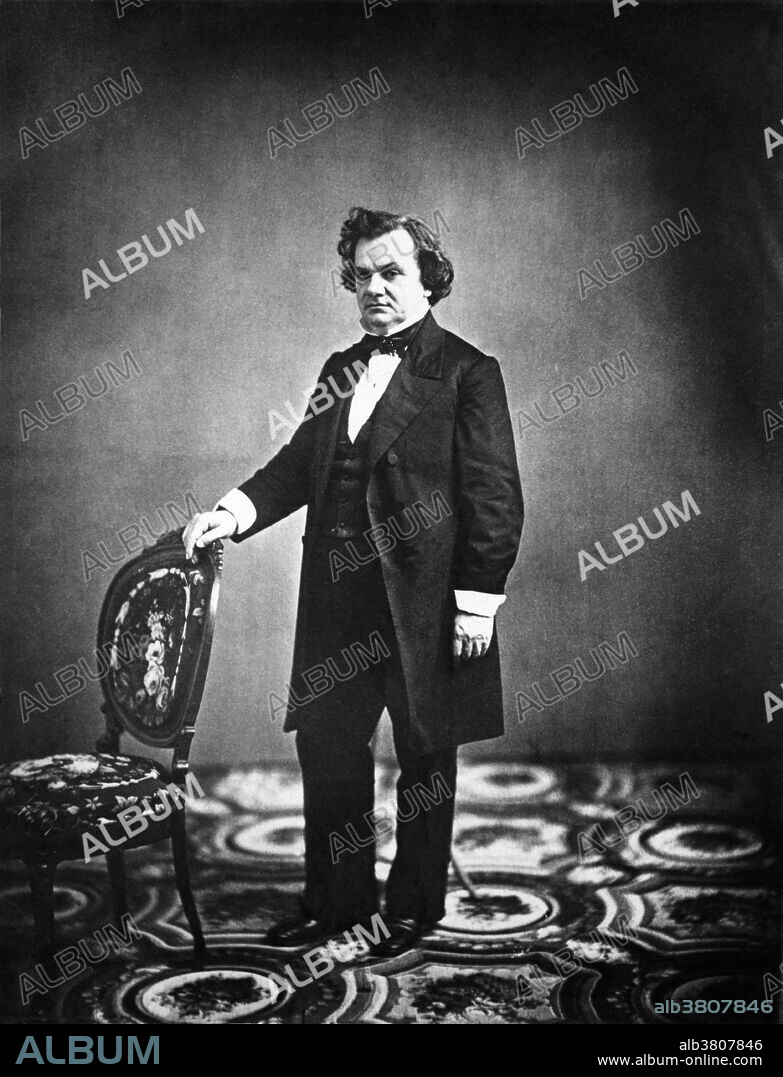alb3807846
Stephen A. Douglas, American Politician

|
Add to another lightbox |
|
Add to another lightbox |



Title:
Stephen A. Douglas, American Politician
Caption:
Stephen Arnold Douglas (April 23, 1813 - June 3, 1861) was an American politician from Illinois. He served as a Representative, Senator, and the Democratic Party nominee for President in the 1860 election, losing to Republican Abraham Lincoln. Douglas had defeated Lincoln in a Senate contest, noted for the famous Lincoln-Douglas debates of 1858, but lost to him in romance. He briefly courted Mary Todd who later married Lincoln instead. He was nicknamed the Little Giant because though short in physical stature, he was a forceful and even dominant figure in politics. He was a leading proponent of democracy, and believed in the principle of popular sovereignty: He was largely responsible for the Compromise of 1850 that apparently settled slavery issues. However, in 1854 he reopened the slavery question with the Kansas-Nebraska Act, which opened some previously prohibited territories to slavery under popular sovereignty. Opposition to this led to the formation of the Republican Party. When civil war came in April 1861, he rallied his supporters to the Union with all his energies, but he died a few weeks later from typhoid fever. He was 48 years old.
Credit:
Album / Science Source / Chicago Historical Society
Releases:
Model: No - Property: No
Rights questions?
Rights questions?
Image size:
3763 x 4920 px | 53.0 MB
Print size:
31.9 x 41.7 cm | 12.5 x 16.4 in (300 dpi)
Keywords:
17TH CENTURY • 1813 • 1861 • AGENT • AMERICAN • BW • CELEBRITIES • CELEBRITY • DEMOCRAT • DIED FROM TYPHOID FEVER • DOUGLAS • FAMOUS • FIGURE • GOVERNMENT • HISTORIC • HISTORICAL • HISTORY • IMPORTANT • LINCOLN-DOUGLAS DEBATES • LITTLE GIANT • MALE • MAN • MANAGER • MEN • NOTABLE • PEOPLE • PERSON • PERSONALITIES • PERSONALITY • POLITICAL • POLITICIAN • POLITICS • POPULAR SOVEREIGNTY • PRESIDENTIAL NOMINEE • REPRESENTATIVE • SENATOR • STEPHEN A. DOUGLAS • STEPHEN ARNOLD DOUGLAS • STEPHEN DOUGLAS • UNITED STATES • US • USA • WELL-KNOWN
 Pinterest
Pinterest Twitter
Twitter Facebook
Facebook Copy link
Copy link Email
Email

